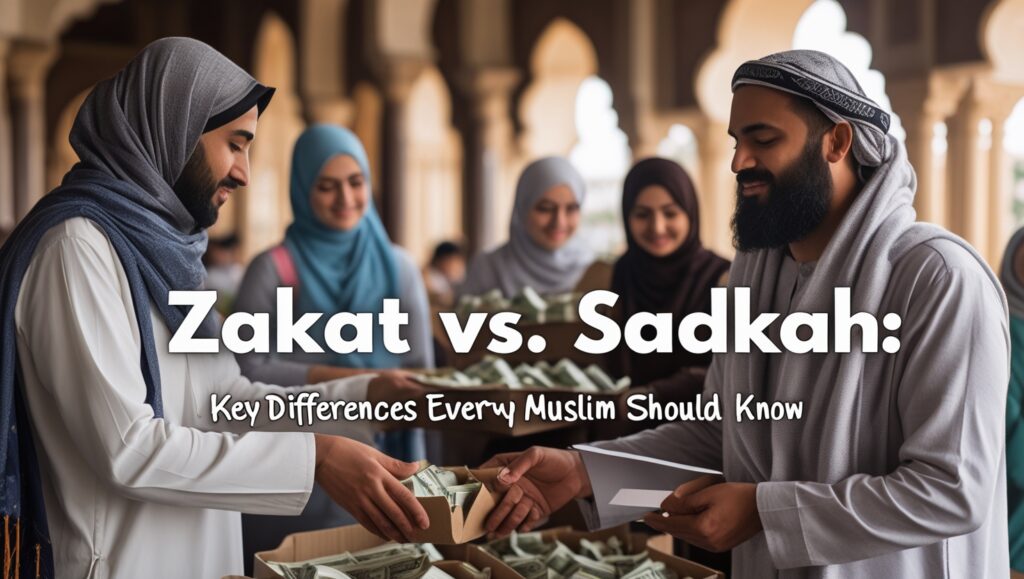Understanding the Basic Meaning
Zakat vs. Sadaqah explains two main forms of giving in Islam. Zakat is a required act of charity that every eligible Muslim must give once a year. Sadaqah is a voluntary act of kindness that anyone can give at any time. One is an obligation and the other is a free choice. Both forms of giving help build strong communities and support people in need. They also remind Muslims to stay humble and thankful for their blessings.
The Obligation and Duty
Zakat vs. Sadaqah helps Muslims understand which act is a duty and which act is optional. Zakat is a fixed duty that must be paid every year when wealth reaches a set limit. It is one of the Five Pillars of Islam. Sadaqah is a kind act that comes from the heart. There are no rules on how much to give. A Muslim may give Sadaqah with money, a smile, or a kind word. Every gift, no matter how small, is valuable when given with sincere intention. Sharing even a little food with someone can make a big difference.
Purpose and Intent
Zakat vs. Sadaqah shows that Zakat cleans wealth and helps the poor meet basic needs. It builds fairness in society and stops wealth from being kept only by rich people. Sadaqah is given to spread kindness and love. It may support any cause or help any person needing help. Both forms of giving are meant to please Allah and strengthen the heart. When Muslims understand the purpose of each form, they are more likely to give with true sincerity and avoid showing off. Giving in private and with a pure intention makes the act more meaningful and accepted.
Calculation and Amount
Zakat vs. Sadaqah points out clear differences in how each is calculated. Zakat requires a Muslim who owns a certain amount of savings to give a fixed portion, usually 2.5 percent. This rule applies once a full lunar year has passed. Sadaqah has no set amount. A person may give a dollar, a meal, or even a single date. The amount comes from sincere feelings and the desire to help. Even children can be taught to give small acts of Sadaqah by sharing toys or offering a kind word to others.
Timing and Conditions
Zakat vs. Sadaqah differs in timing. Zakat must be given once every lunar year when the wealth has reached its limit. It should be given without delay so that those in need receive help on time. Sadaqah can be given anytime, in any place, and without waiting. It may be given during happy moments or during times of difficulty. Giving Sadaqah regularly can build a habit of kindness and make a person more aware of the needs of others. Some people choose to give Sadaqah daily to keep their heart soft and grateful.
Recipients and Distribution
This comparison shows there is a difference in who can receive the gift. Zakat can only be given to eight types of people as mentioned in the Holy Quran, such as the poor, the needy, those in debt, and travelers. A Muslim cannot give Zakat to wealthy people or to close family members who are already well off. Sadaqah can be given to anyone in need, including neighbors, friends, strangers, or even animals. When giving Sadaqah, a person can choose any cause that touches their heart, such as helping orphans, supporting widows, or providing clean water.
Spiritual Growth and Reward
Both forms of charity are important for spiritual growth. Zakat teaches patience and self-control by making a person share their wealth. It builds a strong connection to Allah and keeps the heart safe from greed. Sadaqah teaches kindness and compassion by allowing people to give freely. It improves the heart and creates a stronger bond among people. Giving regularly helps a person to stay connected to their faith and reminds them that every blessing comes from Allah.
Conclusion
Zakat vs. Sadaqah plays a major role in Islamic life. Both forms of charity help people in need and keep society strong and balanced. By knowing the difference between them, Muslims can follow the right path and fulfill their duties with love. Zakat is a required act with rules and limits, while Sadaqah is a voluntary act that comes from a kind heart. Both bring blessings. If you want to learn more and take part in noble acts, reach out to NAIF Center today and start making a positive change. Helping others through acts of charity strengthens unity and brings peace. By practicing charity with true intention, every Muslim can inspire others and create a lasting positive impact. By supporting ethical causes and serving the poor, believers can fulfill their role in society.

